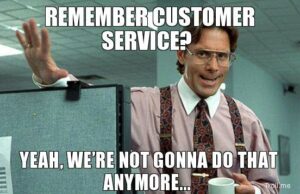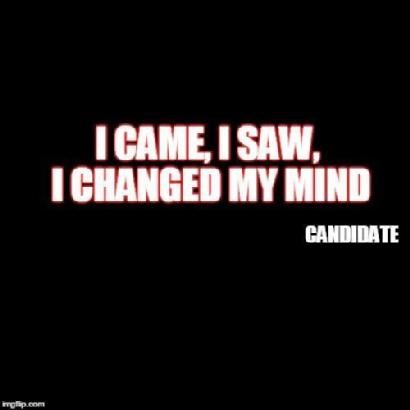 When was the last time you were a candidate instead of a Sourcer or Recruiter? I went through a job search last year, as a candidate, it was evident most recruiters need a lesson in how to provide a better candidate experience. Check out some of these interview experiences I found on Glassdoor:
When was the last time you were a candidate instead of a Sourcer or Recruiter? I went through a job search last year, as a candidate, it was evident most recruiters need a lesson in how to provide a better candidate experience. Check out some of these interview experiences I found on Glassdoor:
“A hiring manager wanted to stop the interview to go pick up her kids. She became annoyed when I suggested rescheduling the interview because I said I did not want to interfere with her responsibilities as a parent. I guess the hiring manager expected me to sit there alone for at least 30 minutes waiting instead of rescheduling.”
Or this gem:
“I was interviewing for an administrative position at a rather large HVAC company. I was talking to the (male) manager in his office and a male employee busted in and said ‘[Has] he hit on you yet? He does that all the time.’
I don’t know if it was a test, [but] I know I had a stunned/mortified look on my face. Never did hear from them again.”
I knew these things happened but never expected them to come from a recruiter seeking an HR professional. Below are my lessons learned and what I focus on now as Head of People.
 1. Set Expectations
1. Set Expectations
Be responsive to your candidates. Be prepared to reviews candidates daily. Set up regular check-ins with your hiring managers. Plan ahead for potential delays such as vacations, product releases, and quarter-end sales pushes.
Want to ruin your company’s “Move Fast” employer brand? Contact a candidate 30 days after she has applied. A true “Move Fast” company contacts her within four days of her submission and makes her an offer in less than 30 days.
2. Automate to Save Time
It is fine to send a template email if you reject an applicant after resume review but personalize your templates for your company brand. It is best to have a separate email template for every stage in your interview process.
During my search, I received a “reviewed your resume” rejection letter from a company where I had completed three rounds of interviews. Their rejection response seemed amateur and impersonal after I had invested 6+ hours. Will I recommend my friends to apply there? No!
 3. Give Better Feedback
3. Give Better Feedback
You should provide more feedback the further a candidate proceeds in the interview process.
Any applicant that interviews onsite deserves a rejection via a phone call. They invested time in your company. The least you can do in return is call them and give them the news in person and feedback for future opportunities.
The best rejection letter I received was short but specific:
Dear Bob,
I wanted to update you on where we are at with the Head of People role that I was talking to you about.
We had over a 100 applicants and the overall quality was outstanding. You made it down to the last 10 people we were considering and each person on that list had one or more characteristics where you led the others. That said we could pick only one and we have just had an acceptance for the role from the person that we felt, ultimately, had the strongest blend of what we need right now.
I cannot tell you how humbled and appreciative I am that you went through this process with us and put yourself forward as someone who could help lead us. Now that we have filled this role I’d love to find a way to continue to work with you….
 4. Teach Interviewers How to Interview
4. Teach Interviewers How to Interview
A fast response time will be for naught if there is a poor experience later in the process. Make sure all interviewers are trained, prepared, and effective at interviewing. Make sure you are answering candidate’s questions as well as asking your own. Look for areas of improvement. Ask applicants how you can improve and how you stack up against the competition. Remember, knowledge is power. Smart Employers understand this and will consistently evaluate the entire interview process.
5. Manage Your Reputation
Candidates and employees are talking about your company whether you like it or not. Monitor what people are saying about your employer brand on venues such as Glassdoor, Twitter, Facebook, Indeed, etc. Respond to feedback, both positive or negative. Thank people for taking the time to share their perspective.
You will never be able to completely control how people perceive your interview process, but if you treat them with respect and dignity, you have a good start.
Good luck!

About Our Author: Bob Lehto is a Human Resources leader with more than a 15 years of progressive HR experience, including managing global HR, recruiting and office staff. He possesses global expertise in both start-up and large technology companies and is passionate about helping start-ups excel through people. Follow him on Twitter at @safetybobsf or on LinkedIn.
By Jackye Clayton
Jackye is an acclaimed thought leader and inspirational speaker on recruiting and DEIB topics. She brings years of experience recruiting across a variety of industries including tech, HR, legal, and finance. In her role as VP of Talent Acquisition and DEIB, she leads all related work at Textio, provides critical expertise to customers, and serves as a leading voice in the products Textio creates for the broader ecosystem. Jackye has been named one of the 9 Powerful Women in Business You Should Know by SDHR Consulting, one of the 15 Women in HR Tech to Follow by VidCruiter, and is on the Top 100 list of Human Resources Influencers by Human Resource Executive Magazine.
Recruit Smarter
Weekly news and industry insights delivered straight to your inbox.





